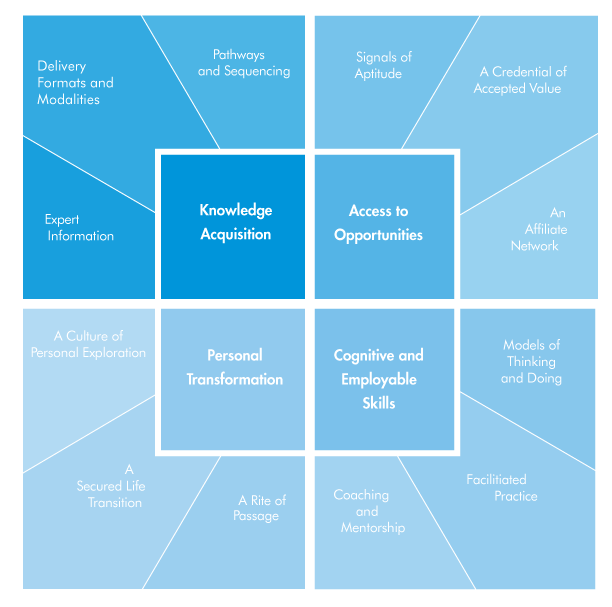Over the past year, I’ve had to update my framework as I realize that the language I use just doesn’t click with the audience. In particular, I kept describing the service from the service provider’s point of view, rather than they value proposition from the customer’s (student’s) point of view. So, here’s how I’ve changed a few value propositions.
“The Content Loop” is now “Knowledge Acquisition.” In the end, people are buying knowledge and the process of acquiring knowledge. They are not buying the Content Loop. The Content Loop is what content providers create to ensure they acquire the knowledge they need. Within that quadrant, I’ve chosen to change Content Authoring to Expert Information. Again, authoring content is what the service provider does; expert information is what people pay for.
Within Access to Opportunities, I’ve changed “Signals of Achievement Velocity” to “Signals of Aptitude.” Largely because these are the same thing, people just get Aptitude because of the SAT. Achievement Velocity, I think, communicates a long run bet on the economic productivity of the student. That being said, people had to think a minute to understand what I was saying when I said achievement velocity. When I say aptitude, they get it immediately.
“Metacontent and Skills” is now “Cognitive and Employable Skills.” Metacontent aslo doesn’t click with people. It means the subliminal things that are taught, largely by the instructor being an example: how to do a math problem, how to give a presentation, how to respond to complex and tough questions. Often when you interview alumni 10 years out they remember their instructors because of the metacontent, and they don’t remember the content at all. However, “metacontent” isn’t really a word. When I’ve used the phrase “cognitive skills” it seems to resonate. The education establishment seems to use “cognitive skills” to describe learnings that are picked up earlier in life: Grammar, grit, problem solving – things that get deeply embedded in the brain and character of individuals. This being said, young adults pick up a lot of behavioral models and life-skills that help them work for economic organizations while they’re in college – and none of them are taught directly.
Within “Personal Transformation,” I’ve changed “A Personal Platform” into “A Secured Life Transition.” What I always meant was that people need an intermediate step in between where they are now and where they want to be. A Personal Platform makes sense, but it’s confusing to most people. A Secured Life Transition has worked better in presentations, that’s for sure.
Sorry for the confusion. Thanks for bearing with me. In the end, you always have to test ideas, products and services with the market. If the market doesn’t get what you’re saying, you have to adapt.




















